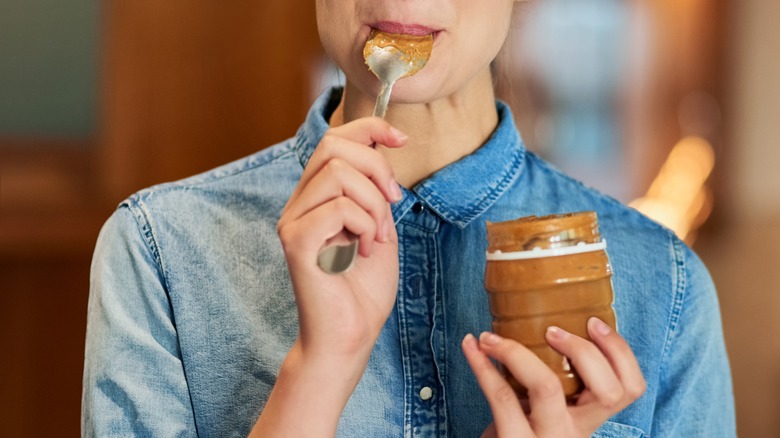Avoid Eating Peanut Butter If You Have This Medical Condition
Some health conditions require us to leave certain food items out of our diet. Those with a shellfish allergy, for example, can't eat shrimp. Alternatively, people with diabetes are advised to avoid foods that are high in sugar or saturated fat.
Although some processed peanut butter products come with added sugar and trans fat, more natural peanut butter may offer us various health benefits. According to the U.S. Department of Agriculture (USDA), in a 100-gram serving of peanut butter, you'll find 22.5 grams of protein, 4.8 grams of fiber, and a host of vitamins and minerals, including potassium, calcium, magnesium, phosphorus, and more. Packed with antioxidants, healthy fats, and minimal carbs, peanut butter can be both delicious and nutritious, explains Healthline.
However, there are instances in which peanut butter may be harmful to one's health. Specifically, peanut butter can become a choking hazard for people diagnosed with a condition known as dysphagia, according to experts from the Commonwealth of Virginia Department of Behavioral Health and Developmental Services.
Swallowing can be challenging for those with dysphagia
A person with dysphagia has trouble swallowing, explains Drugs.com. Most often seen in older adults, the condition can stem from nerve or muscle damage in the throat, blockages from esophageal tumors, as well as spasms, inflammation, or scarring, among many other causes. Those with dysphagia may also experience drooling, pain, regurgitation, gagging, acid reflux, weight loss, and more. In severe cases, a person may require emergency medical attention.
The Commonwealth of Virginia Department of Behavioral Health and Developmental Services advises against the consumption of nut butters for those with dysphagia to minimize the chances of potentially life-threatening choking incidents. Experts highlight how the sticky nature of nut butters can make it easy for them to become caught in our airways and subsequently hinder respiration. Researchers from a 2020 study published in BMC Geriatrics looked at nine different soft foods of varying textures and how much swallowing effort each food required for older adults. The food items examined in the study were boiled mashed potatoes, boiled mashed sweet potatoes, boiled mashed pumpkin, mayonnaise, whipped cream, red bean paste, mango pudding, soft tofu, and peanut butter.
Peanut butter requires more effort to swallow
The study findings revealed that foods with increased adhesiveness required the greatest amount of swallowing effort (via BMC Geriatrics). Out of all nine food items, peanut butter ranked as the top food for perceived stickiness and proved to be the most difficult for older adults to swallow due to increased strain placed on the muscles and tongue (via Commonwealth of Virginia Department of Behavioral Health and Developmental Services). For these reasons, experts advise those with doctor-ordered dietary restrictions limited to pureed, minced, moist, soft, and/or bite-sized foods to steer clear of peanut butter.
If you believe you may be experiencing signs of dysphagia, talk to your doctor, as they can run tests to help confirm a diagnosis. Depending on the type of dysphagia you have, treatment options can range from swallowing exercises to prescription drugs, surgery, or dietary changes. This includes eating smaller portions, chewing your food at a slower pace, reducing one's caffeine and alcohol intake, and avoiding challenging foods like peanut butter.



